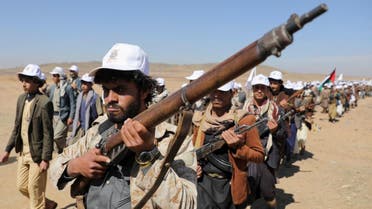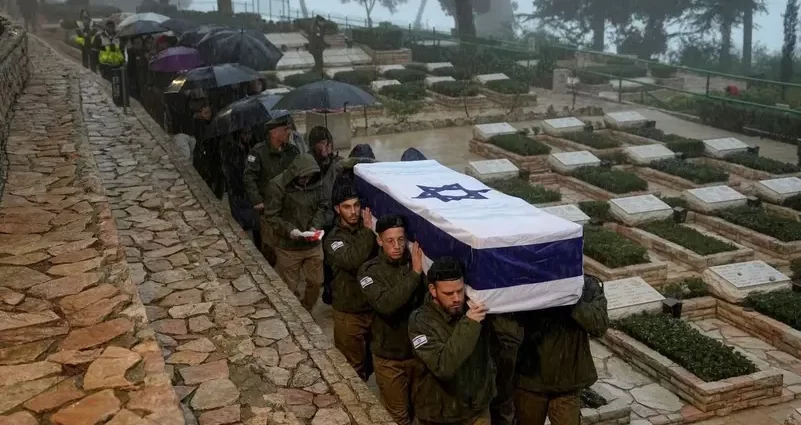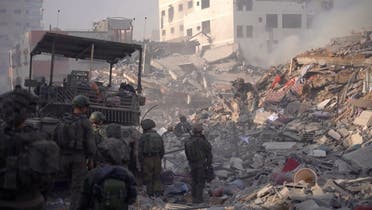Rocket fire by Palestinian militants likely caused a blast that collapsed two buildings and killed a group of Israeli soldiers in the Gaza Strip, a military spokesperson said on Tuesday.
Israel on Monday suffered the highest daily death toll of its Gaza offensive with 24 fatalities including 21 in the rocket-propelled grenade (RPG) attack in central Gaza and three elsewhere.
“A militant squad surprised the force with RPG fire. The first rocket hit one of the buildings in which explosives had been laid. The hit apparently led to the explosion that caused the collapse of the building and the building next to it,” Rear Admiral Daniel Hagari told reporters in Tel Aviv.
Most of the soldiers died as a result of the explosion and the building’s collapse, Hagari said. Two who were securing the area in a nearby tank were killed by a second rocket, Hagari said, citing an initial inquiry.
The soldiers laid the explosives as part of an operation to clear the area, about 600 meters (650 yards) from the Israeli border, Hagari said.
The military was still studying the incident, Hagari said. Over the past 24 hours, he added, Israeli forces killed more than 100 militants in western Khan Younis in southern Gaza, he said.
Israel faces rising pressure to end Gaza war on deadliest day for troops
Israel on Tuesday said 24 soldiers died in the biggest single-day losses since the start of its ground war in Gaza amid growing pressure on the government to end the conflict.
Israel’s army said 21 of the 24 troops killed on Monday were reservists slain when rocket-propelled grenade fire hit a tank and two buildings they were trying to blow up.
Prime Minister Benjamin Netanyahu said an investigation was launched into the “disaster” and that Israel “must learn the necessary lessons.”
More than 200 people attended the funeral of one of the reservists, Hadar Kapeluk, whose coffin was draped with an Israeli flag, at Mount Herzl military cemetery in Jerusalem.
Among the mourners was 23-year-old Jonathan Moore, a childhood friend of Kapeluk, who told AFP the soldier was “always the light.”
Israela Oron, of the Ben-Gurion University in the Negev, said the mounting toll of soldiers killed — now 221 — since Israel launched its ground offensive in Gaza will heap pressure on the government.
“Everybody is mourning the soldiers… people will demand clear answers about the purpose and the goal of this operation in Gaza.”
Khan Younis ‘encircled’
On the ground, fighting raged in Khan Younis, southern Gaza’s main city, which the Israeli army said it had “encircled.”
Gaza’s Hamas-run health ministry said Israeli tanks fired on Nasser hospital in Khan Younis on Tuesday, with “dozens expected wounded.”
The Israeli military did not immediately respond when asked by AFP about firing at the hospital.
The Palestinian Red Crescent said Israeli forces had hit its headquarters in Khan Younis “resulting in injuries among internally displaced individuals who sought safety on our premises.”
UN agencies and aid groups have sounded the alarm about the growing threat of disease and famine in Gaza, where 1.7 million people are estimated to have been uprooted.
Gaza is “slipping every day into a much more catastrophic situation,” said Abeer Etefa, senior Middle East spokeswoman for the World Food Program.
The territory has “the largest concentration of people in what looks like famine-like conditions anywhere in the world,” she added.
The Gaza war broke out with Hamas’s unprecedented October 7 attacks, which resulted in the deaths of about 1,140 people in Israel, mostly civilians, according to an AFP tally based on Israeli official figures.
In response, Israel has carried out a relentless offensive that has killed at least 25,490 people in Gaza, around 70 percent of them women, young children and adolescents, according to the health ministry in the Hamas-run territory.
Militants also seized 250 hostages, and Israel says around 132 remain in Gaza. That number includes the bodies of at least 28 dead hostages, according to an AFP tally based on Israeli figures.
Hopes for hostage deal
Netanyahu’s vow to destroy Hamas is increasingly seen within the cabinet as incompatible with returning hostages, experts say.
A week-long truce in November saw 105 hostages released, the Israelis among them in exchange for Palestinian prisoners held in Israeli jails.
US news outlet Axios reported on Monday that Israel had proposed to Hamas, via Qatari and Egyptian mediators, a new deal to free all the hostages.
The report, citing unnamed Israeli officials, said the proposed deal would be carried out in multiple stages and involve releasing an undetermined number of Palestinian prisoners.
The plan was expected to take about two months to complete.
The proposal does not include promises to end the war but would involve Israeli troops reducing their presence in major cities in Gaza and gradually allowing residents to return to the territory’s devastated north, Axios said.
Qatar’s foreign ministry declined to comment on the ongoing negotiations and said many media reports “are either missing elements or completely false.”
US media said the White House’s coordinator for the Middle East, Brett McGurk, was expected in Egypt and Qatar for meetings aimed at securing a new hostage exchange deal.
A Palestinian source familiar with the talks told AFP a Hamas delegation arrived in Cairo on Tuesday to meet Egypt’s intelligence chief and discuss new ceasefire proposals.
US, UK hit Yemen’s Houthis
The Gaza war has spurred fears of a wider escalation, with a surge in violence involving Iran-backed Hamas allies across the region.
Lebanon’s Shia movement Hezbollah said Tuesday it struck the Israeli air control base of Meron for a second time in recent weeks, in response to Israeli “assassinations” and attacks on civilians.
The United States and Britain launched new airstrikes against Yemen’s Iran-backed Houthis on Tuesday over their attacks on Red Sea shipping.
The Houthis, who say their action targets Israeli-linked shipping in solidarity with Palestinians in Gaza, warned “these attacks will not go unanswered and unpunished.”
“Shortly after taking these strikes, an additional Houthi target was struck by the US in self-defense, destroying an anti-ship cruise missile that was prepared to launch and which presented an imminent threat to vessels operating in the region,” Pentagon spokesman Major General Pat Ryder said.
The additional strike occurred “probably within 15 to 30 minutes of the main operation there,” Ryder told journalists.
US and British forces carried out a first wave of strikes against the Iran-backed rebel group earlier this month and followed that up with further joint strikes overnight.
The United States has also launched multiple unilateral air raids against missiles that Washington said posed imminent threats to civilian and military vessels.
Overall, “we assess that we’ve destroyed or degraded over 25 missile launch and deployment facilities” and have “struck unmanned aerial vehicle, coastal radar and air surveillance capabilities, as well as weapons storage areas, with good effects,” Ryder said.
The Yemeni militia began striking Red Sea shipping in November, saying they were hitting Israeli-linked vessels in support of Palestinians in Gaza, which has been ravaged by the Hamas-Israel war.
The Houthis have since declared US and British interests to be legitimate targets as well.
In addition to military action, Washington is seeking to put diplomatic and financial pressure on the Houthis, redesignating them as a terrorist organization last week after dropping that label soon after President Joe Biden took office.

Yemen’s Iran-backed Houthi militia has ordered all US and British staff of the United Nations and its agencies to leave the country within a month, a UN official told AFP.
In a letter dated January 20 and shared on social media, the authorities in the Houthi-controlled capital Sanaa told the UN resident coordinator that employees with British and US nationality had one month to “prepare to leave the country.”
“They must be ready to leave as soon as the deadline expires,” the document said, adding that 24 hours’ notice would be given by letter.
For all the latest headlines follow our Google News channel online or via the app.
While they only control a fraction of Yemen’s territory, the Houthis hold sway over most of the country’s population centers.
A UN official confirmed to AFP that they had received the memo.
“The UN and its partners have taken note of this and are waiting to see what are the next steps,” said the official, who asked to remain anonymous.
Peter Hawkins, the UN’s humanitarian coordinator in Yemen, is himself British.
The expulsion followed joint strikes by the US and Britain against the Houthis aimed at ending the group’s attacks on commercial shipping in the Red Sea and Gulf of Aden, threatening global trade.
The US has launched multiple further strikes and on Tuesday carried out a second set of joint strikes with Britain.
Last week, Washington redesignated the Houthis a “global terrorist group,” having lifted it in 2021 to ease aid delivery to the impoverished country.
The Houthis have fought a nearly decade-long civil war against government forces, who are backed by an Arab coalition.
The conflict plunged Yemen, by far the poorest country on the Arabian Peninsula, into a deep humanitarian crisis, labelled among the worst in the world by the UN.
Since mid-November, the Houthis have launched missiles and drones from Yemen’s coast aimed at shipping the group says is linked to Israel, in solidarity with the Palestinians in Gaza.
Gaza is under siege by Israel, which aims to destroy Hamas after the militant group’s surprise attack of October 7.
The Houthis have reacted to the US and British strikes with defiance, targeting further ships.
The US, Israel’s major ally and provider of military equipment, has created an international coalition to patrol the Red Sea and protect commercial traffic.




